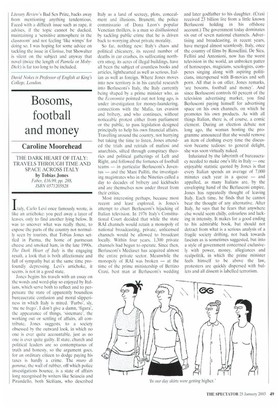Bosoms, football and money
Caroline Moorehead
THE DARK HEART OF ITALY: TRAVELS THROUGH TIME AND SPACE ACROSS ITALY by Tobias Jones Faber, £16.99. pp. 288, ISBN 0571205828 Italy, Carlo Levi once famously wrote, is like an artichoke: you peel away a layer of leaves, only to find another lying below. It was to uncover what was really there, to expose the parts of the country not normally seen by tourists, that Tobias Jones settled in Parma, the home of parmesan cheese and smoked ham, in the late 1990s. The Dark Heart of Italy is the engaging result, a look that is both affectionate and full of sympathy but at the same time profoundly depressing. Levi's artichoke, it seems, is not in a good state.
Jones begins his travels with an essay on the words and word-play so enjoyed by Italians, which serve both to reflect and to perpetuate the state of apparently boundless bureaucratic confusion and moral slipperiness in which Italy is mired, Turbo', sly, 'me ne frego', I don't give a damn, 'figura', the appearance of things, `sistemare', the working out or settling of affairs, all contribute. Jones suggests, to a society obsessed by the outward look, in which no one is ever quite accountable, just as no one is ever quite guilty. If state, church and political leaders are so contemptuous of truth and honesty, so the argument goes, for an ordinary citizen to dodge paying his taxes is hardly a crime. The muro di gomma, the wall of rubber, off which police investigations bounce, is a state of affairs long recognised by writers like Sciascia and Pirandello, both Sicilians, who described
Italy as a land of secrecy, plots, concealment and illusions, Brunetti, the police commissario of Dona Leon's popular Venetian thrillers, is a man so disillusioned by tackling public crime that he is driven back to worrying about private morality.
So far, nothing new: Italy's chaos and political chicanery, its record number of deaths in car crashes, its suffocating northern smog, its acres of illegal buildings, have all been the subject of countless books and articles, lighthearted as well as serious, Italian as well as foreign. Where Jones moves into new territory is in his careful research into Berlusconi's Italy, the Italy currently being shaped by a prime minister who, as the Economist pointed out not long ago, is under investigation for money-laundering, connections with the Mafia, tax evasion and bribery, and who continues, without noticeable protest either from parliament or the public, to pass legislation designed principally to help his own financial affairs. Travelling around the country, not hurrying but taking the time to listen, Jones attended the trials and retrials of mafiosi and anarchists, sifted through conspiracy theories and political gatherings of Left and Right, and followed the fortunes of football teams — in particular Berlusconi's Juventus — and the Mani Pulliti, the investigating magistrates who in the Nineties called a day to decades of bribery and kickbacks and are themselves now under threat from their critics.
Most interesting perhaps, because most recent and least explored, is Jones's attempt to chart Berlusconi's hijacking of Italian television. In 1976 Italy's Constitutional Court decided that while the state RAE channels would retain a monopoly of national broadcasting, private, unlicensed channels would be allowed to broadcast locally. Within four years, 1,300 private channels had begun to operate. Since then, Berlusconi's Mediaset has acquired almost the entire private sector. Meanwhile the monopoly of RAI was broken — at the time of the prime ministership of Bettino Craxi, best man at Berlusconi's wedding
and later godfather to his daughter. (Craxi received 23 billion lire from a little known Berlusconi holding in his offshore account.) The government today dominates six out of seven national channels. Advertising and broadcasting, in recent years, have merged almost seamlessly. Italy, once the country of films by Rossellini. De Sica, Fellini and Antonioni, now has the worst television in the world, an unbroken patter of horoscopes, magicians, sexologists, comperes singing along with aspiring politicians, interspersed with B-movies and soft porn. All that is on offer, Jones remarks, 'are bosoms, football and money'. And since Berlusconi controls 60 percent of the television advertising market, you find Berlusconi paying himself for advertising space on his own channels, on which he promotes his own products. As with all things Italian, there is, of course, a comic element. During an election debate not long ago, the woman hosting the programme announced that she would remove an item of clothing every time the discussion became tedious: to general delight, she was soon virtually naked.
Infuriated by the labyrinth of bureaucracy needed to make one's life in Italy — one enjoyable statistic quoted by Jones is that every Italian spends an average of 7,000 minutes each year in a queue — and appalled, as many Italians are, by the enveloping hand of the Berlusconi empire. Jones has repeatedly thought of leaving Italy. Each time, he finds that he cannot bear the thought of any alternative. After Italy, he says that he fears that anywhere else would seem chilly, colourless and lacking in intensity. It makes for a good ending to his admirable book, but should not detract from what is a serious analysis of a fragile society drifting, not back towards fascism as is sometimes suggested, but into a style of government concerned exclusively with power, money, allegiances and realpolitik, in which the prime minister feels himself to be above the law, protesters are quickly dispersed with bullets and all dissent is labelled terrorism.


















































































 Previous page
Previous page